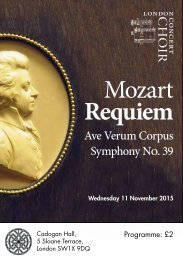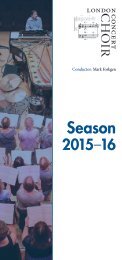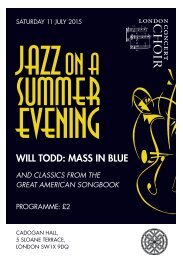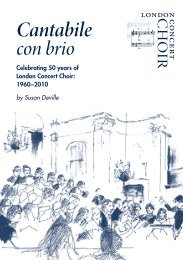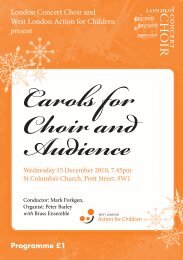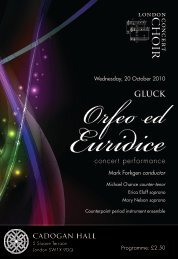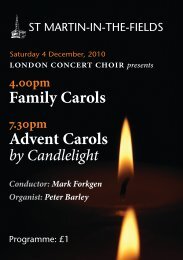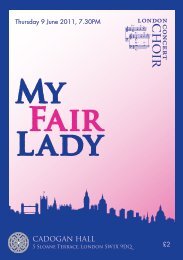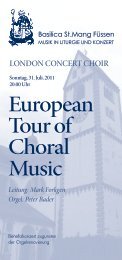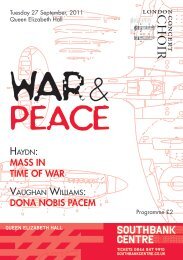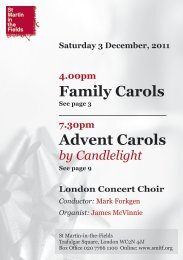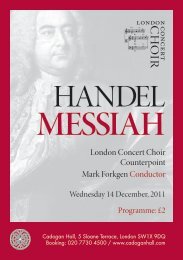10 March, 2015: Elijah (Mendelssohn)
Create successful ePaper yourself
Turn your PDF publications into a flip-book with our unique Google optimized e-Paper software.
Felix <strong>Mendelssohn</strong> (1809–1847)<br />
ELIJAH (Op. 70)<br />
Oratorio for soloists, chorus, orchestra and organ<br />
Text derived from the Lutheran Bible<br />
by Julius Schubring and the composer<br />
English version by William Bartholomew<br />
Toby Stafford-Allen<br />
Nicholas Mulroy<br />
Jeanette Ager<br />
Erica Eloff<br />
Harry Mobbs treble<br />
Canticum semi-chorus<br />
London Concert Choir<br />
<strong>Elijah</strong> the Prophet<br />
Ahab, King of Israel; Obadiah, Ahab’s Steward<br />
Queen Jezebel; an Angel<br />
The Widow; an Angel<br />
The Youth<br />
Angels<br />
Israelites, Priests of Baal<br />
In 1846, the Birmingham Music Festival hosted the premiere of Felix <strong>Mendelssohn</strong>’s<br />
oratorio <strong>Elijah</strong>, a sacred work based on the Old Testament prophet’s life. The organizers<br />
had commissioned a new work by the anglophile German composer whose first oratorio<br />
St Paul had been a great success at the 1837 festival. In the course of his busy life<br />
<strong>Mendelssohn</strong> visited Britain many times, formed close associations with this country and<br />
was well-loved here. The reaction to the first performance of his <strong>Elijah</strong> was extraordinary.<br />
<strong>Mendelssohn</strong> himself conducted the work in a midday performance to an audience of<br />
two thousand in Birmingham Town Hall. The heartfelt commitment of the musicians,<br />
‘all executing the music with special zest and the utmost fire and spirit’, as <strong>Mendelssohn</strong> wrote<br />
afterwards, left the audience transfixed – until the last note which, according to the Times,<br />
‘was drowned in a long-continued unanimous volley of plaudits, vociferous and deafening. It<br />
was as though enthusiasm, long-checked, had suddenly burst its bonds and filled the air with<br />
shouts of exultation. ... Never was there a more complete triumph – never a more thorough<br />
and speedy recognition of a great work of art’. A full four choruses and four arias were encored.<br />
This extraordinary response to a sacred work of music is evidence of <strong>Mendelssohn</strong>’s success<br />
in conveying the drama of <strong>Elijah</strong>’s story, thus appealing to the emotions of his audience<br />
and gripping their attention, instead of following the advice of his librettist and friend, the<br />
Lutheran pastor Julius Schubring, who had repeatedly urged the composer to ‘keep down




